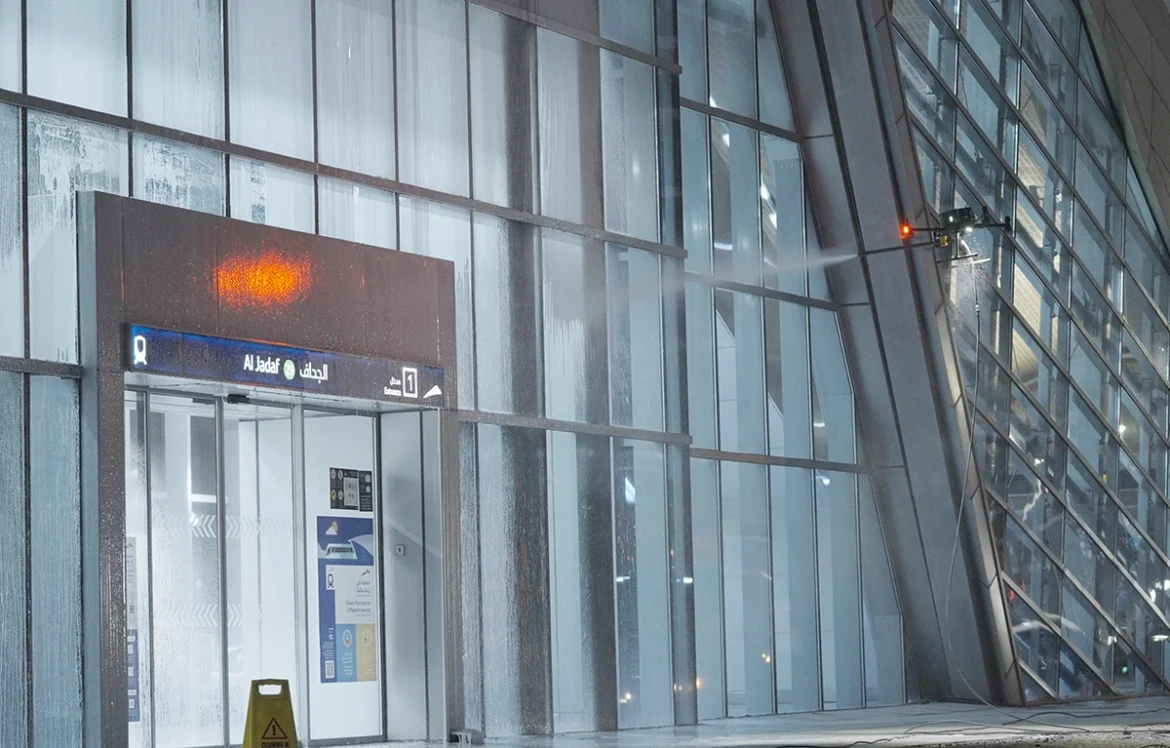In a groundbreaking move toward smarter, safer, and more sustainable urban infrastructure, Dubai’s Roads and Transport Authority (RTA), in partnership with Keolis MHI — the operator of Dubai Metro and Dubai Tram — has initiated the use of drone technology to clean the facades of metro and tram stations.
This pioneering trial underscores RTA’s commitment to embracing cutting-edge solutions that enhance operational safety, conserve resources, and align with the city’s long-term environmental strategies.
Drone-based cleaning system
The new drone-based cleaning system represents a significant advancement over traditional methods. Previously requiring up to 15 workers per station, the new approach reduces manpower by over 50%, operating efficiently with a streamlined crew of just eight people.
The shift also minimizes safety risks associated with working at height or in hard-to-reach areas, offering a smarter alternative to conventional cleaning techniques.
Mohammed Al Ameeri, Director of Maintenance at RTA’s Rail Agency, stated: “This pilot initiative reflects RTA’s commitment to adopting innovative technologies that enhance safety, optimise resources, and support Dubai’s sustainability goals. Trialing drone-based facade cleaning is a step towards smarter maintenance practices that reduce environmental impact and safeguard worker well-being, fully aligned with our strategy to transform mobility services across the city.”
He added: “Drones reduce the need for workers to be exposed to high-risk areas, while using less water per station which is a meaningful contribution to our environmental strategy. Working with Keolis MHI on this initiative provides many opportunities, and with the continuous development and enhancement of automated solutions, we can support safer, greener infrastructure maintenance.”
Exploring a smarter, sustainable future
While traditional cleaning methods still provide greater flexibility and precision in certain contexts, the drone-based approach is yielding valuable operational insights. RTA and Keolis MHI are currently evaluating a hybrid model that blends both technologies, aiming to strike a balance between sustainability, effectiveness, and long-term operational efficiency.
Vikas Sardana, Chief Operating Officer at Keolis MHI, expressed strong support for the initiative: “We’re proud to support RTA’s strategic objectives and Dubai’s vision of a smart, sustainable city through this partnership. We believe innovation begins with curiosity and courage, and this trial produced adequate results that bring us closer to a safer, smarter, and more sustainable transit system for the people of Dubai.”
He further noted: “This trial supports the broader vision of Dubai’s Roads and Transport Authority (RTA) to transform public transport through innovation, efficiency, and sustainability. Aligned with Dubai’s Clean Energy Strategy 2050 and Smart Dubai initiative, the drone-based cleaning trial reflects Keolis MHI’s dedication to being an active partner in shaping the future of mobility and urban services.”
This initiative not only reinforces Dubai’s ambitions under the Clean Energy Strategy 2050 and the Smart Dubai framework, but also sets a precedent for other global cities seeking to integrate automation into public transport operations.
With continued collaboration between RTA and Keolis MHI, Dubai is charting a clear course toward a future where innovation drives cleaner, safer, and more efficient urban mobility.
tanvir@dubainewsweek.com

